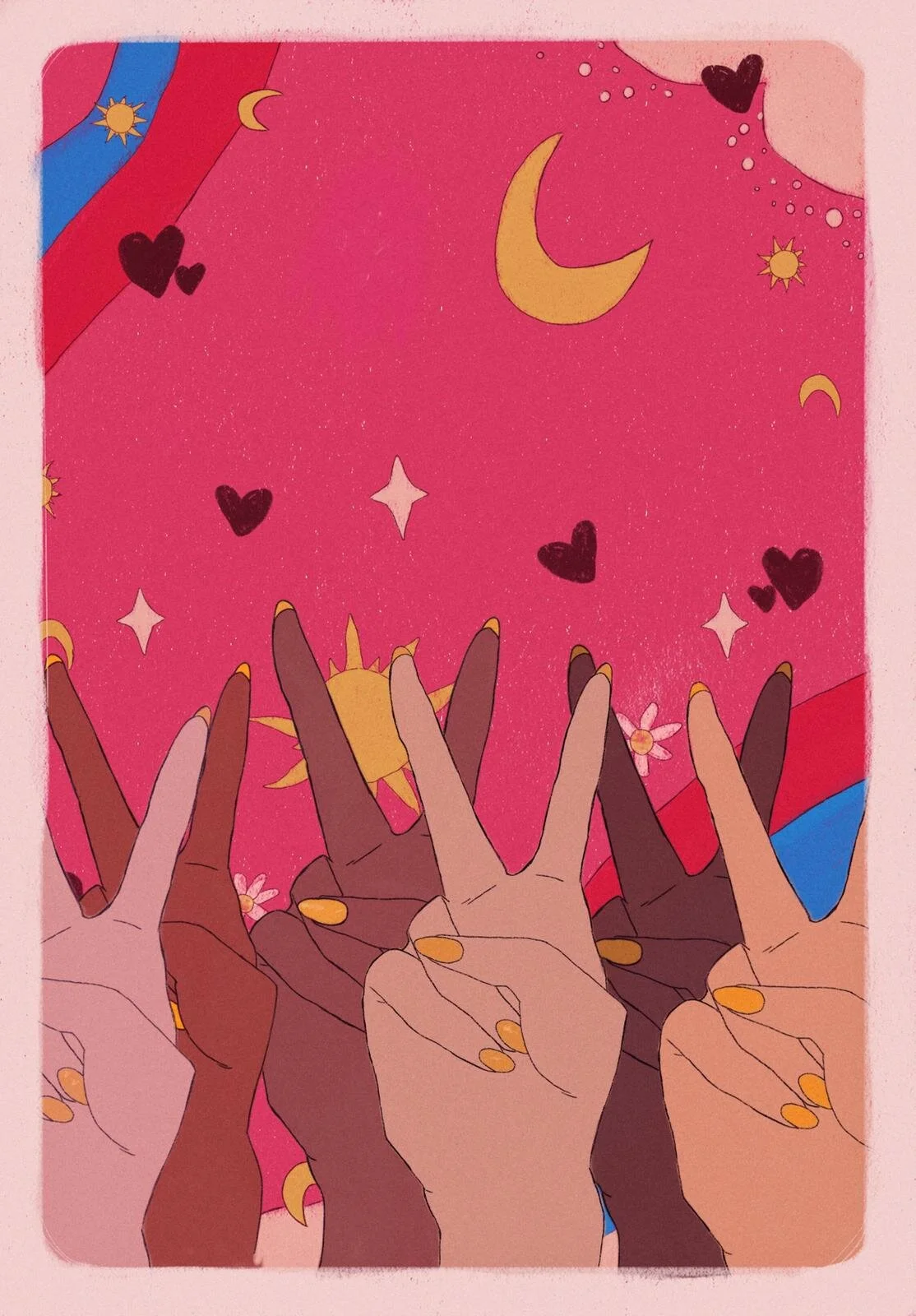Intersectional Feminism
By Macha Ball
Graphic Design by Sharon Awanbor
Do you consider yourself a feminist? In this day and age, many people will answer this question positively. Despite this, feminism can be a tricky term, and some still refuse to consider themselves feminists, by fear of accepting a system where men are rendered inferior. But the truth is, feminism is about equality for all folks, not superiority for some.
What is intersectional feminism?
No one should be excluded from feminism and feminist action. There should be no exception for members of the LGBT+ community, especially transgender women. There should be no exception for BIPOC (Black, Indigenous, People of Colour) women, or for women with disabilities, fat women, sex workers, and the list goes on. There is no such thing as feminism excluding any of these people from its fights and beliefs. This is understood by the term ‘intersectional feminism’, coined in 1989 by Lawyer and civil rights advocate Kimberlé Crenshaw. Activists such as Chidera Eggerue also point out that feminism should not just include more marginalised women: it should be led by them.
Who should my feminism include?
The answer to this is simple: everyone! If you consider yourself a feminist, you should be concerned with the rights of all women. There is no room in the feminist movement for racism, ableism, fatphobia, transphobia, homophobia or any other form of discrimination.
What can I do now?
Don’t limit your fight to people who look like you. Be outraged at the murder of transgender women. Support the Black Lives Matter movement. Respect people’s pronouns. Respect sex workers. Most importantly, listen to what all women have to say! Before anything can change, the voices of marginalised people must be heard. Follow a variety of women on social media. Read books and articles written by marginalised women. Call people out on their bullsh*t!! In other words, don’t be complacent. Talk about intersectional feminism with your family and friends. Hear your granny say something transphobic or racist? Call her out! It’s not easy, but it’s so worth it, and so important.
Who can I listen to?
If you want to learn more on this topic, Instagram is a great place to start. If used properly, social media can be an incredible way to educate yourself! Never before have we had access to the voices of so many people from all over the world. Take advantage of it. Do you only follow people who look like you, come from the same place as you, or share a similar social background with you? Let’s change that! If you don’t know where to start, we’ve compiled a little list for you at the end of this article. But here are two particularly impactful women to get a good head start. If you haven’t heard of Chidera Eggerue (@theslumflower) yet, now is the time! Eggerue is a feminist activist, author of What a Time to Be Alone and How to Get Over a Boy, and creator of #SAGGYBOOBSMATTER. On top of being extremely aesthetically pleasing, her two works will teach you how to value yourself without external – male – approval, and how to set boundaries – among other things. These two books are definitely a fabulous read for anyone and everyone! Eggerue is not only fantastic advocate for feminism and self-appreciation, but she’ll also teach you a great deal about yourself, and about how respecting others starts with respecting yourself. We highly recommend you to also follow Blair Imani, educational influencer and historian, who will teach you all about equality, feminism, racism, ableism, and so much more. Before we move on, here’s a little reminder that although social media is free, many influencers have Patreons or Paypal pages through which you can help support them. If you feel someone has taught you something, pay them! This is especially important if they come from a more marginalised social group than you. Not only is this a great way to thank them, but it’s also a step in the right direction for the redistribution of wealth from white people to BIPOC.
What to avoid?
It is important to remember that being oppressed is not exclusive of being an oppressor. This applies if you are a white woman, if you are straight, cis, able-bodied, etc. Although women are oppressed, there is a huge amount of privilege attached to being white – if you are - or to being straight – if you are. That is why it is so important to listen to and help amplify the voices of Black women, Indigenous women, other women of colour, LGBT+ women, women with disabilities, fat women, sex workers, and all women who are part of another marginalised group. Avoid speaking over more marginalised women. Instead, help make their voices heard! It’s okay to make mistakes. The important thing is that you learn from them. If you make a mistake and someone corrects you – for example, if you misgender someone – don’t make them feel sorry or uncomfortable for you. Simply thank them for correcting you, and move on. No fuss.
Instagram accounts to follow (non-exhaustive list):
@theslumflower @blairimani @emmadabiri @bodyposipanda @meg.boggs
@monachalabi @thatsinglemum @emmadabiri @wheelchair_rapunzel @aoc
@greengirlleah @ihartericka @chantayyjayy @darkest.hue @zolwia
@florencegiven @curvynyome @thesineadburke @rubyrare @jaylenembararia
@iamrachelricketts @nonbinaryicon @globalgirlhood @monicagreatgal @womensmarch

